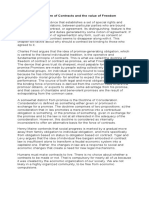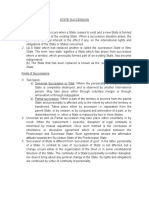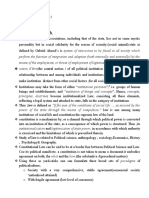Resolved: The United States Ought To Guarantee Universal Health Care For Its Citizens
Resolved: The United States Ought To Guarantee Universal Health Care For Its Citizens
Uploaded by
ChristinaHoangCopyright:
Available Formats
Resolved: The United States Ought To Guarantee Universal Health Care For Its Citizens
Resolved: The United States Ought To Guarantee Universal Health Care For Its Citizens
Uploaded by
ChristinaHoangOriginal Description:
Original Title
Copyright
Available Formats
Share this document
Did you find this document useful?
Is this content inappropriate?
Copyright:
Available Formats
Resolved: The United States Ought To Guarantee Universal Health Care For Its Citizens
Resolved: The United States Ought To Guarantee Universal Health Care For Its Citizens
Uploaded by
ChristinaHoangCopyright:
Available Formats
HEALTH AC I AFFIRM the resolution.
Resolved: The United States ought to guarantee universal health care for its citizens.
To provide clarity in the round, the following definitions will be provided: Ought: used to express obligation Guarantee: an assurance for the fulfillment of a condition Universal health care: a system that provides organized health coverage to all citizens of a governed region and is publicly funded through taxation Citizens: A legally recognized subject or national of a state or commonwealth, either native or naturalized.
The value of the round will be government legitimacy and the criterion will be the upholding of the social contract.
Contention 1: Government, as an entity, cannot have moral values. Subpoint A: As a body of the legal system, the government is not a whole person, and is instead a collection of many representatives, and therefore, cannot have moral values. This means that the US government does not have any type of moral obligation towards its citizens. Instead, the government is under a unilateral contract in which one party alone makes a promise in exchange for an act or service.[CORNELL UNIVERSITY LAW SCHOOL: A unilateral contract is a contract created by an offer than can only be accepted by performance. A unilateral contract can be formed by an express offer stating that the offer can only be accepted through performance.] The United States government had contracted to uphold and protect our granted freedoms and rights. In return for this contractual obligation [THE FREE DICTIONARY: an agreement with specific terms between two or more persons or entities in which there is a promise to do something in return for a valuable benefit known as consideration] the citizens are expected to support the government in fiscal and physical way if necessary. Subpoint B: The whole idea that a country would have a "moral obligation" is unethical on the basis of Ethical Relativism, that ethics and morals are relative to each Nation or even culture and that there is no standard ethical or moral policy that all nation-states ought to abide by.
HEALTH AC Contention 2:Under its unilateral contract to its citizens, the United States has a contractual obligation to uphold the social contract. Subpoint A: A social contract is defined as an implicit agreement among the members of a society to cooperate for social benefit. Thomas Hobbes argued that the absolute power of the sovereign is justified by a hypothetical social contract in which the people agree to obey him in all matters in return for a guarantee of peace and security, which they lack in the warlike state of nature posited to exist before the contract is made. Under this social contract, the United States is qualified to guarantee universal health care which can only have benefits for the people.
Therefore, judge, I urge you to vote affirmative. I am now open for cross-examination.
You might also like
- Relation Between Law and StateDocument14 pagesRelation Between Law and StateNehmat Sethi95% (41)
- Political ObligationDocument6 pagesPolitical ObligationVikas JadhavNo ratings yet
- Social Contract Assignment Entry FieldsDocument3 pagesSocial Contract Assignment Entry FieldselfelipeNo ratings yet
- Midterms - Official Civil Welfare Training Service ReviewerDocument31 pagesMidterms - Official Civil Welfare Training Service ReviewerNiña Ricci MtflcoNo ratings yet
- Chapter 2 NewDocument20 pagesChapter 2 Newbahan.john321No ratings yet
- State Community of Persons, More or Less Numerous, Permanently Occupying A Fixed Territory, andDocument16 pagesState Community of Persons, More or Less Numerous, Permanently Occupying A Fixed Territory, andPatrick RamosNo ratings yet
- Name: Hmanshu Ruhella Roll No: 375: Objectives of Human Rights EducationDocument9 pagesName: Hmanshu Ruhella Roll No: 375: Objectives of Human Rights Educationhimanshu rohillaNo ratings yet
- OnyekachiDocument2 pagesOnyekachiJust EmmyNo ratings yet
- General ProvisionsDocument267 pagesGeneral Provisionsru ruNo ratings yet
- Poli Law ReviewerDocument5 pagesPoli Law ReviewerDenn Reed Baring Tuvera Jr.No ratings yet
- Elements of Government EditedDocument34 pagesElements of Government EditedemmanueldbarnabasNo ratings yet
- Consti QuizDocument21 pagesConsti Quizdennis buclanNo ratings yet
- State Policy: BTX San Beda College-Manila College of LawDocument5 pagesState Policy: BTX San Beda College-Manila College of LawMichaella ReyesNo ratings yet
- EXAM-to Be Continued-1Document6 pagesEXAM-to Be Continued-1abbomichael42No ratings yet
- Bussiness Law, B.MGTDocument29 pagesBussiness Law, B.MGTanatoliNo ratings yet
- Summary: The Freedom Agenda: Review and Analysis of Mike Lee's BookFrom EverandSummary: The Freedom Agenda: Review and Analysis of Mike Lee's BookNo ratings yet
- Quiz #5 - EduardoDocument1 pageQuiz #5 - EduardoRayBradleyEduardoNo ratings yet
- Chapter 3: The Nature of Contracts and The Value of FreedomDocument3 pagesChapter 3: The Nature of Contracts and The Value of FreedomDiana Klaudine BenedictoNo ratings yet
- The United States Bill of Rights QuizDocument7 pagesThe United States Bill of Rights QuizEUGENE DEXTER NONESNo ratings yet
- Social Contract by UNDocument13 pagesSocial Contract by UNRinku BalwadaNo ratings yet
- 1 Commerce Clause: 1.1 Relevant Constitutional Text (Article, Amendment, Section )Document4 pages1 Commerce Clause: 1.1 Relevant Constitutional Text (Article, Amendment, Section )Bobby LewisNo ratings yet
- STATEDocument5 pagesSTATEAnima MundaNo ratings yet
- Chapter 1 (Obli)Document9 pagesChapter 1 (Obli)Rennejarek BenitezNo ratings yet
- Pak in World AffairsDocument47 pagesPak in World AffairsGul BadshahNo ratings yet
- ConstitutionDocument75 pagesConstitutionkanegi5309No ratings yet
- Constitutional Law CasesDocument5 pagesConstitutional Law CasesRaiza SarteNo ratings yet
- State SuccessionDocument5 pagesState SuccessionAnshuSinghNo ratings yet
- Chapter Summary: FederalismDocument4 pagesChapter Summary: FederalismcanvellNo ratings yet
- Note On Constitutional Law 1-1Document25 pagesNote On Constitutional Law 1-1Jamal0% (1)
- Common-Law Trust Consumer/Consumer Protection Laws Defined Public Notice/Public RecordDocument3 pagesCommon-Law Trust Consumer/Consumer Protection Laws Defined Public Notice/Public Recordin1or100% (1)
- Answer To Constitutional Law AssignmentDocument5 pagesAnswer To Constitutional Law Assignmentninesixone1No ratings yet
- Article IIDocument15 pagesArticle IIDennis AndradaNo ratings yet
- This Amendment Is To Be A Serere Blow On The Rule of LawDocument2 pagesThis Amendment Is To Be A Serere Blow On The Rule of LawNethsara BookshopNo ratings yet
- Constitution of The United StatesDocument1 pageConstitution of The United Statesalibek dadajonovNo ratings yet
- Constitutional LawDocument5 pagesConstitutional Lawavcisude0032No ratings yet
- SUCCESSIONDocument4 pagesSUCCESSIONamithamridhulanNo ratings yet
- PSM3 1Document14 pagesPSM3 1mbbombitaNo ratings yet
- All Contracts Are Agreement But All AgreDocument16 pagesAll Contracts Are Agreement But All AgreManish Dubey0% (1)
- 02a-Ba222-Wk1 Development of The LessonDocument4 pages02a-Ba222-Wk1 Development of The Lesson1222 Lascuña Haina MecahNo ratings yet
- Mebre - Collection of Public LawsDocument149 pagesMebre - Collection of Public LawsTeweldebrhan MamoNo ratings yet
- Welfare State: Related Contributors & BibliographyDocument2 pagesWelfare State: Related Contributors & BibliographyArchana ShankerNo ratings yet
- Human Rights FinalDocument4 pagesHuman Rights Finals zamanNo ratings yet
- The Social Contract and Constitutional RepublicsDocument10 pagesThe Social Contract and Constitutional RepublicsMichael A. BerturanNo ratings yet
- Oblicon PDFDocument42 pagesOblicon PDFSamuel BarboNo ratings yet
- Consti State ImmuDocument10 pagesConsti State ImmuHecel LoreenNo ratings yet
- 2017 Bar Political Law Questions and AnswersDocument8 pages2017 Bar Political Law Questions and AnswersMark RyeNo ratings yet
- (Oath) (Notice of The People's Inherent Rights)Document3 pages(Oath) (Notice of The People's Inherent Rights)ademariano74No ratings yet
- BiggovDocument11 pagesBiggovapi-263038792No ratings yet
- State and INTERNATIONAL LAWDocument32 pagesState and INTERNATIONAL LAWvnsh.t03No ratings yet
- Constitutional Law I Short ReviewDocument4 pagesConstitutional Law I Short ReviewPablo Lorenzo BenedictoNo ratings yet
- The Law On Obligations and Contracts: By: Mary Chris Austria-Cruz, PH. D. Marilou P. Pascual, PH.DDocument9 pagesThe Law On Obligations and Contracts: By: Mary Chris Austria-Cruz, PH. D. Marilou P. Pascual, PH.DRennejarek BenitezNo ratings yet
- What Is Political Obligation?Document8 pagesWhat Is Political Obligation?armyk5991No ratings yet
- Welfare State, Concept of Government in Which TheDocument2 pagesWelfare State, Concept of Government in Which TheAnonymous FDZiWuE3pNo ratings yet
- Welfare State BritainDocument2 pagesWelfare State BritainekcccNo ratings yet
- Chapter Xxix Tortious Liability & CompensationDocument68 pagesChapter Xxix Tortious Liability & CompensationHarshita RanjanNo ratings yet
- The State and Its ElementsDocument10 pagesThe State and Its ElementsEilleen Grace Menggoy67% (6)
- The Social Contract and Constitutional RepublicsDocument10 pagesThe Social Contract and Constitutional Republicshasna.ansary.24No ratings yet
- Business LawDocument8 pagesBusiness Lawompankaj1996No ratings yet
- JurisprudenceDocument21 pagesJurisprudenceDenis BhatiaNo ratings yet
- Collection of All Public Law Short Note Prepared by YuunivarsiitiiDocument216 pagesCollection of All Public Law Short Note Prepared by YuunivarsiitiiAli HusenNo ratings yet
- Anambra State of Nigeria Civil Service Rules - Revised To 1st July 1978Document290 pagesAnambra State of Nigeria Civil Service Rules - Revised To 1st July 1978ugbochukwuebukaNo ratings yet
- Appointment - SK Tres and SK SecretaryDocument8 pagesAppointment - SK Tres and SK SecretaryChin RiosNo ratings yet
- G.R. No. L-18792 February 28, 1964 The People of The Philippines, Plaintiff-Appellee, vs. Guillermo BELLO, Defendant-Appellant. FactsDocument2 pagesG.R. No. L-18792 February 28, 1964 The People of The Philippines, Plaintiff-Appellee, vs. Guillermo BELLO, Defendant-Appellant. FactsRobinson AntonioNo ratings yet
- People v. WagsDocument11 pagesPeople v. WagsAlthea M. SuerteNo ratings yet
- 3.5.1 Guideline For Implementation of Sponsored Research Projects and Consultancy ProjectsDocument7 pages3.5.1 Guideline For Implementation of Sponsored Research Projects and Consultancy ProjectsRishit ShahNo ratings yet
- Agreement For PlacementDocument3 pagesAgreement For Placementnishucheeku100% (1)
- Obligation and Contract Art 1159 CasesDocument6 pagesObligation and Contract Art 1159 CasesMaricar BautistaNo ratings yet
- The Most Controversial Specific Instance of MisdirectedDocument6 pagesThe Most Controversial Specific Instance of MisdirectedShahzad ShameemNo ratings yet
- 1109021 (1)Document1 page1109021 (1)Cms Stl CmsNo ratings yet
- GD Topics With DiscussionDocument14 pagesGD Topics With DiscussionRakesh Singh0% (1)
- Special Power of AttorneyDocument1 pageSpecial Power of AttorneyfhpilarbataanNo ratings yet
- OUTlaws Law School LGBTQA Organizations' Joint Letters To Canadian Law SocietiesDocument55 pagesOUTlaws Law School LGBTQA Organizations' Joint Letters To Canadian Law SocietiesDouglas W. JudsonNo ratings yet
- ToRs For Commonwealth Court Transformation Consultancy May 2020Document4 pagesToRs For Commonwealth Court Transformation Consultancy May 2020bonobomonkeyNo ratings yet
- Karnataka Industrial Establishments (National and Festival Holidays) Act, 1963 PDFDocument10 pagesKarnataka Industrial Establishments (National and Festival Holidays) Act, 1963 PDFLatest Laws TeamNo ratings yet
- Chain of Custody, Illegal Sale of Dangerous Drugs (PRINTED)Document2 pagesChain of Custody, Illegal Sale of Dangerous Drugs (PRINTED)Antonio J. David IINo ratings yet
- Law Books IndexDocument24 pagesLaw Books IndexAnonymous LbLwAzNxrI100% (1)
- Child Labour Act 1986Document3 pagesChild Labour Act 1986AjayNo ratings yet
- PNB Vs CFI of RizalDocument12 pagesPNB Vs CFI of RizalDexter Circa0% (1)
- Evidence Outline GivenDocument42 pagesEvidence Outline GivenKylee ColwellNo ratings yet
- Announcements Colorado Supreme Court MONDAY, OCTOBER 25, 2010Document12 pagesAnnouncements Colorado Supreme Court MONDAY, OCTOBER 25, 2010Circuit MediaNo ratings yet
- The Indian Contract Act (ICA), 1872Document31 pagesThe Indian Contract Act (ICA), 1872Gaurav GuptaNo ratings yet
- 4 Marohombsar Vs AdiongDocument2 pages4 Marohombsar Vs AdiongnikitaspongebobNo ratings yet
- (P3,300,000.00), Philippine Currency, Payable As FollowsDocument3 pages(P3,300,000.00), Philippine Currency, Payable As FollowsMPat EBarr0% (1)
- PardonDocument2 pagesPardonLouise Mikhaela Rose Escarrilla100% (2)
- 2021 San Beda Red Book Taxation Law-UnlockedDocument277 pages2021 San Beda Red Book Taxation Law-UnlockedPaolo Ongsiako100% (1)
- RESULTSDocument9 pagesRESULTShafizm.behjat2008No ratings yet
- THE MAGNA CARTA FOR PUBLIC SCHOOL TEACHERS Sec.3Document11 pagesTHE MAGNA CARTA FOR PUBLIC SCHOOL TEACHERS Sec.3Chiengkaii Gabas SanagaNo ratings yet
- Marital Settlement Agreements in California.20121213.221544Document2 pagesMarital Settlement Agreements in California.20121213.221544anon_953122277No ratings yet
- Searcy Story Complaint Filed 07-16-19 1Document17 pagesSearcy Story Complaint Filed 07-16-19 1Jordan MickleNo ratings yet
- Carriage of Goods by Sea - The Bill of LadingDocument1 pageCarriage of Goods by Sea - The Bill of LadingfotiniNo ratings yet

























































































